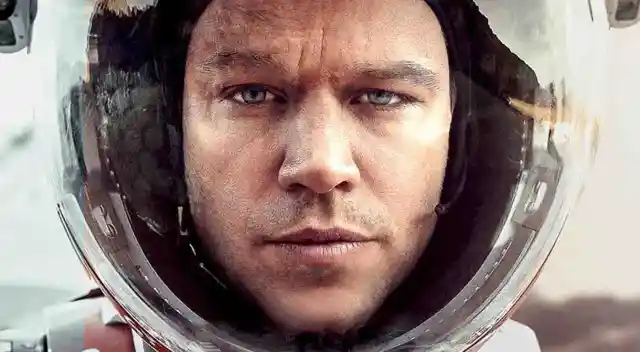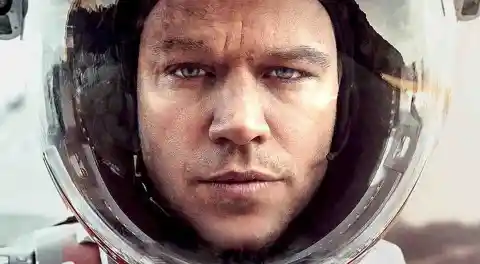

Now, Ridley Scott is a name that brings with it controversy within cinema circles. Having made his name with classic films such as Alien, Blade Runner and the cult classic Legend (Tom Cruise, not Tom Hardy), he has more recently made waves in the movie world for his less than impressive efforts such as Prometheus and Exodus: Gods and Demons. Scott is back, and he is back with a film that is out of this world. Literally.
The Martian sees Scott return to where he feels most comfortable: space. During a manned mission to Mars, a storm hits a team of astronauts as they conduct research at a station on the red planet and they are forced to abandon their work. One astronaut, Mark Watney (Damon) is hit by debris and presumed dead. Much to the displeasure of the crew he is left behind as they board their ship and leave. Unbeknownst to the crew, Watney survives, and when he wakes up he finds himself stranded on Mars with only a back catalogue of disco music for company. Mark now has to find a way to survive on Mars, alone, for four years, which is when the next scheduled Mars mission is due to land. The film follows Mark as he logs his progress and problem solves in order to survive. Thankfully Mark is a botanist. What Mark doesn’t realize is that NASA learns that he is alive and a rescue mission is developed, assuming they can get there before either he dies or fuel runs out.
The Martian is a very welcome return to form for Ridley Scott. The Martian is based on a popular novel by Andy Weir, and the screenplay was adapted by Drew Goddard, known for creating the recent Daredevil TV series as well as for writing films such as Cloverfield, Cabin in the Woods and World War Z. With this screenplay Goddard has managed to create a piece that is about space, but has character development that promotes the humanistic element that has been absent from Scott’s recent work. Scott has managed to utilize a very well-developed screenplay and add in his trademark strong visuals to create a film that is aesthetically pleasing while also providing substance and humor.
The humor is an important part to this film, and it mirrors the overall atmosphere. The Martian is much more upbeat than other recent space films, such as Interstellar (just how many times do we need to save Matt Damon from space?) or Gravity, aided in no small part by the 70s disco soundtrack. Who wouldn’t want a bit of ABBA keeping them company on a desolate planet? Rather than portray itself as a desperate attempt to question life and take Mark Watney on a journey of self-discovery, The Martian focuses on survival and strength. Physical strength, mental strength and strength of personality. This strength of personality shines through on the character of Mark Watney. He holds onto his sense of humor and who he is as a person rather than starting to fade away or transforming into a typically preachy lesson learner.
The Martian also manages to place women in positions of authority and responsibility while also keeping them strong. The captain of the mission is Melissa Lewis, played admirably by Jessica Chastain. Lewis plays the captain with a strength that is only marginally impeded by her emotion towards her crew members. At no point does she break down, and at no point are the difficult decisions she needs to make too much for her to cope with. It is almost a shame that her character, and indeed the rest of the crew, do not have more screen time as it would be interesting to delve deeper into her character.
This lack of emotional breakdown within The Martian is what sets it apart from other films of the same ilk. So often we see these films of survival and strength overshadowed by a love story. It was present in Armageddon, it was present in Gravity and it is present in the majority of films where space travel is involved. Whilst this is most definitely part of the trauma faced by astronauts, what about those for whom it is not? And is it necessarily a strong element in a film about one person’s survival? It is refreshing when watching The Martian that there is not a typical underlying love story or even an emotional connection that is being tested. The only thing that is being tested in terms of Watney is himself and his own strength. This helps create an insular environment for Watney. Without any strong connections to Earth, there is an increased atmosphere of being completely alone.
The Martian is a fresh take on an overused genre, offering the most humanistic look at space travel that has been produced for mainstream cinema in a long time. There are strong performances throughout the film, despite critics’ questioning of the appearance of Sean Bean as a mission leader. Ethereal cinematography adds to the strong script writing, rather than the other way around, and the upbeat feel of the comedy makes this a story of strength and determination rather than putting audiences through the emotional ringer. Ridley Scott has turned the beat of his films around with The Martian. Welcome back to Earth, Mr Scott. Welcome back indeed.